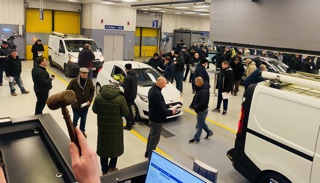With the technology now available, it is possible to monitor the activities of people in almost any working environment. Tracking devices can be put into delivery vans, digital cameras can observe the movements of staff around a showroom, customer feedback can be tracked remotely and the working speed of mechanics can be logged.
The challenge is whether this level of supervision and monitoring is good for the employee and/or the employer.
In reality, the retail automotive business has for years practised a form of ‘scientific management’, with controlled sales systems requiring the salesperson to follow a routine including a diary system that leads to the making of a number of telephone calls, followed by appointment bookings which then lead to a number of test drives (whether wanted or not). It is no wonder that the level of staff turnover in some dealerships is so high.
If you hire people of poor quality that you don’t trust, you have to have a rigid process to allow them to operate in a way that is felt to be moderately appropriate. The classic example is the ability of companies such as McDonald’s to hire staff and then simply drive them through a process which produces standardised, mass-produced burgers.
The problem for the retail automotive sector is that the world is changing. Customers are better informed than ever through access to the internet and social media. Is the ‘scientific management’ and monitoring of sales staff appropriate in a modern era with sophisticated customers? Of course there is a need to supervise, to manage and control, but surely the biggest issue will be in what is actually perceived to be the experience for the customer.
Car customers are looking for a personalised experience
Production lines are good for mass production of products. Customers may be looking for something more personalised, not a mass-produced experience. By over-supervising, not only are salespeople demotivated, they are also restricted in how they are able to react to the customer.
A colleague who works at the university went to buy a new car. She stated at the outset what she wanted and that she didn’t want a test drive. As she was about to leave, the salesperson asked that if the manufacturer contacted her, could she say she had been offered a test drive? My colleague said ‘why, I didn’t want one’. The salesman replied ‘I have to offer it even if I know you didn’t want one’.
Her response was simply ‘Why?’ There was no response from the salesperson – unfortunately that answer wasn’t in the script.



















Alan Murrells (Taybray Ltd Recruitment) - 11/07/2014 06:21
I have recruited and managed dozens of people over the last few decades and have consistently found that hiring people with a positive attitude and then giving them as much freedom to do the job as you can is the route to high productivity and profit, and satisfied staff and customers. Supervision should always be minimal to provide only absolutely necessary direction and occasional corrective action. More important is to show interest in what they've done and positive feedback. They won't do what you would have done or do it in the way you would have done it in almost all cases, but the end result will be much better all round and they will stay loyal to you.